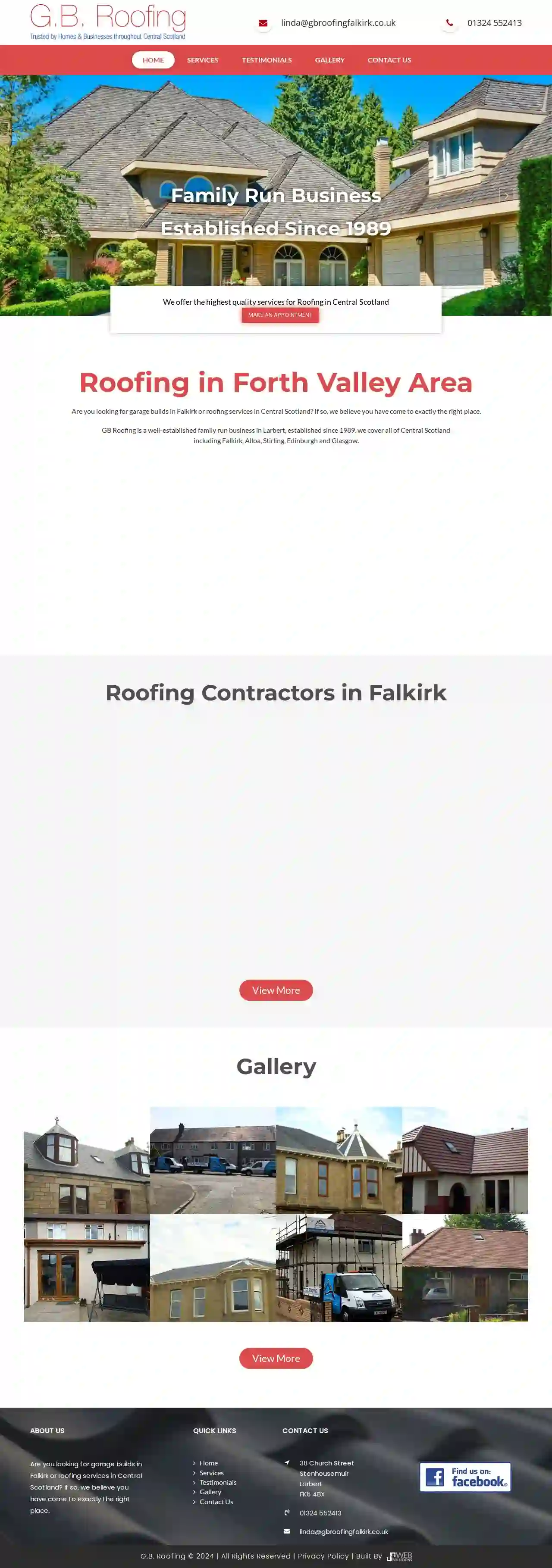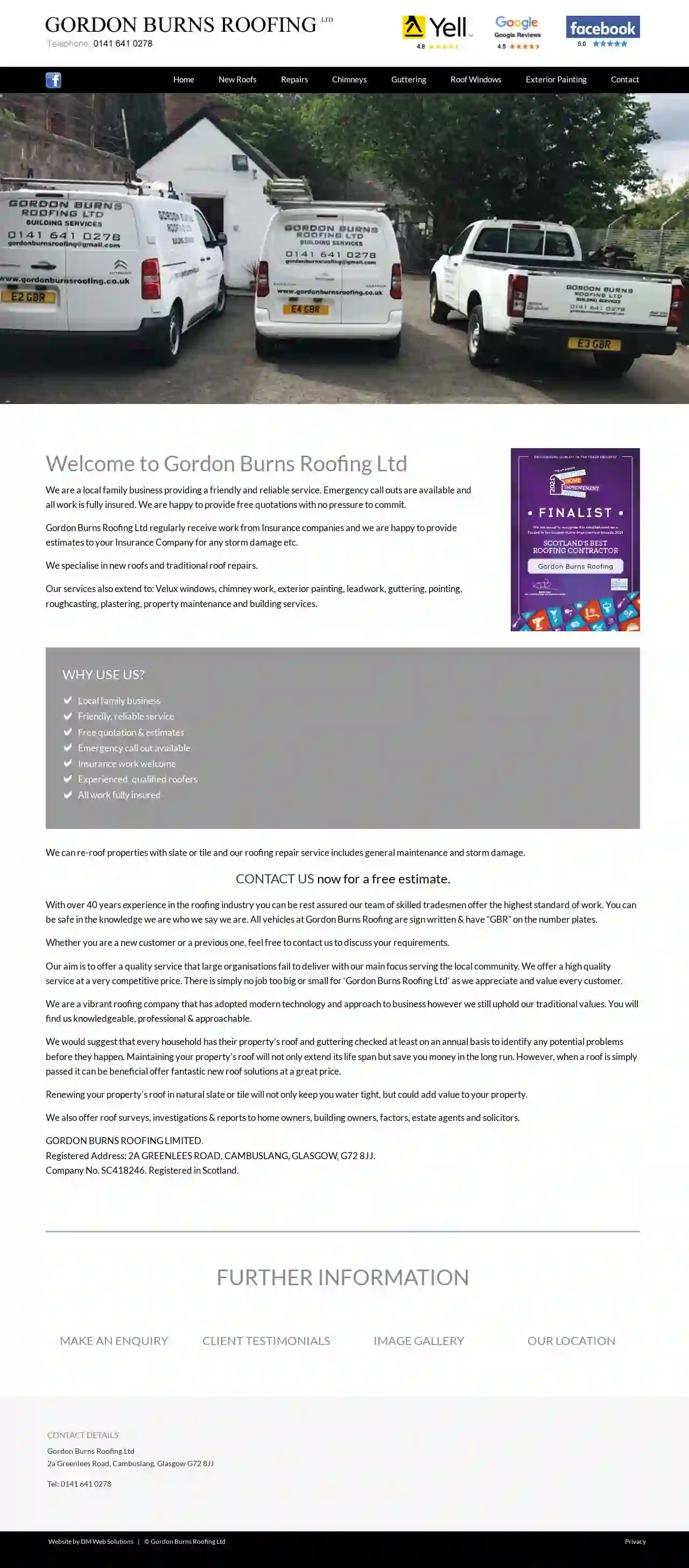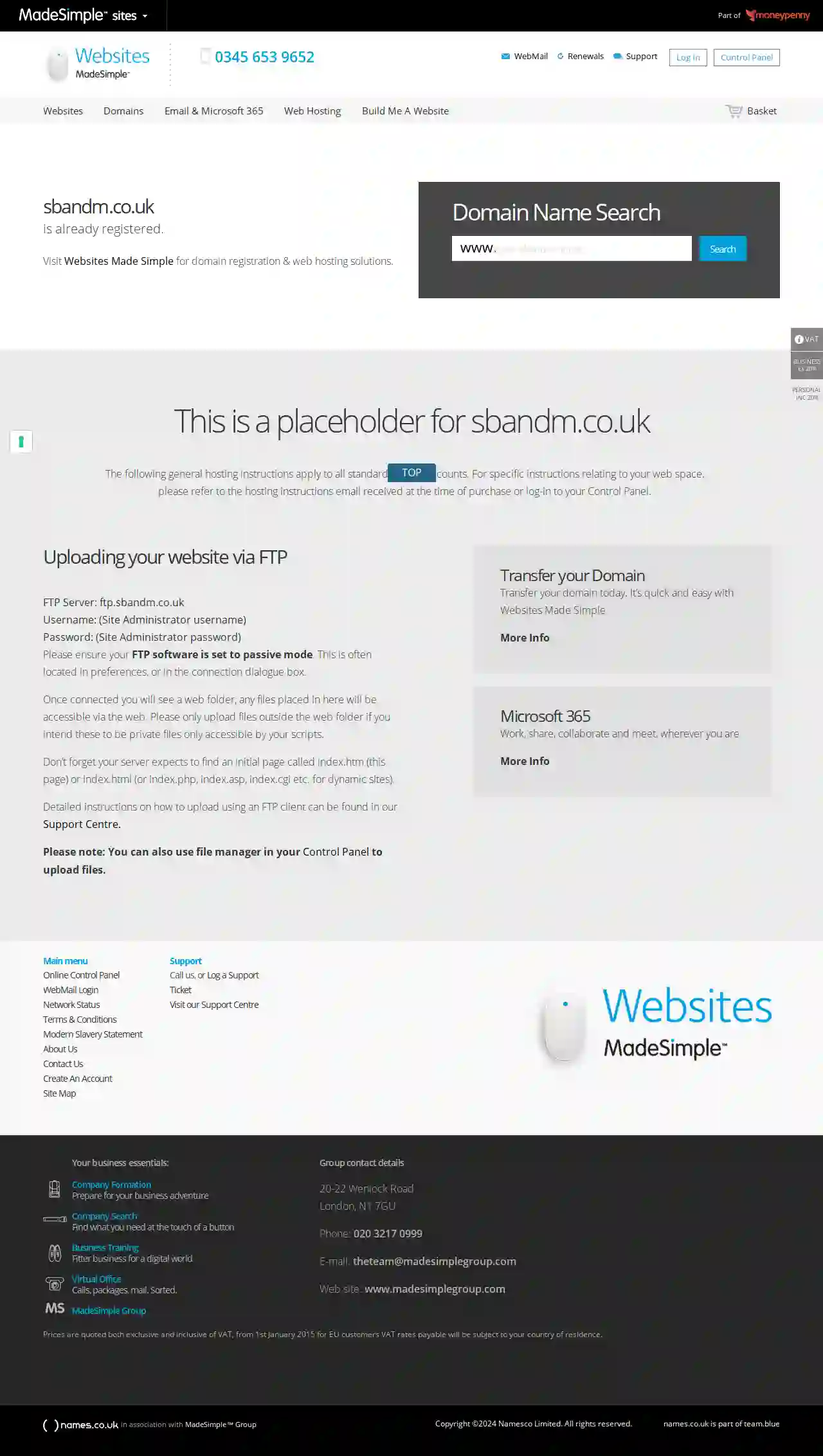Roofing Companies Cambusbarron
Best Roofing Companies in Cambusbarron
Get up to 3 Roofers quotes for your project today! Compare profiles, reviews, accreditations, portfolio, etc... and choose the best offer.

GB Roofing
48 reviewsStenhousemuir, Larbert, 38 Church Street, FK5 4BX, GBFamily Run Business Established Since 1989 We offer the highest quality services for Roofing in Central Scotland make an appointment Previous Next Roofing in Forth Valley Area Are you looking for garage builds in Falkirk or roofing services in Central Scotland? If so, we believe you have come to exactly the right place. GB Roofing is a well-established family run business in Larbert, established since 1989. we cover all of Central Scotland including Falkirk, Alloa, Stirling, Edinburgh and Glasgow. Martin and Jason are trained and competent in the Roofing trade having achieved many certificates in the trade. A long-time family friend and employee, Michael is reliable and trustworthy, he has worked for us for many years. All employees are trained in health and safety awareness. Our client base includes our local authorities, local churches, the golf club, junior football stadium and many more domestic clients. We specialized in felt roofing, rough casting and roof re-tiling and are on hand to answer any questions you might have. Our fantastic reputation means many of our customers come to us through recommendations from previous delighted clients. This has been achieved by our excellent workmanship along with our very competitive prices. We only use the very highest quality materials in our work and all of our work is guaranteed, with back up insurance if required. We hold £10,000,000 public liability and £5,000,000 employers liability insurance for your peace of mind. We promise to leave the site clean and clear of any waste generated by our work to ensure no inconvenience is caused to our client.
- Services
- Why Us?
- Testimonials
- Gallery
Get Quote
Tradetech Roofing limited
4.958 reviewsPlot 4, Bridgend Industrial Estate, 2 Gartferry Road, Glasgow, G69 0JD, GBTradetech Roofing Limited is a highly-rated roofing company based in Glasgow, serving the local community with a commitment to quality workmanship and exceptional customer care. We specialize in a wide range of roofing services, including new roof installations, roof replacements, roofline repairs, chimney repairs, lead work, and roughcasting. With years of experience and countless 5-star reviews, we are proud to be recognized as one of the best roofing companies in Glasgow and Lanarkshire. We believe in providing honest and transparent pricing, keeping our customers informed every step of the way. Our team stays up-to-date with the latest roofing products and building regulations to ensure we deliver the highest standards of service. Whether you have a pitched or flat roof, we'll recommend the best approach for your specific needs. We also offer free quotes and are available to answer any questions you may have.
- Services
- Why Us?
- Gallery
Get Quote
Dalgrain Roofing & Building Ltd
GBLanarkshire Roofing Network is a network of trusted roofing professionals serving Lanarkshire and surrounding areas. We offer a comprehensive range of roofing services for both domestic and commercial properties, including roof repairs, flat roofing, pitched roofing, fascias and soffits, and more. Our experienced and qualified members are dedicated to providing high-quality workmanship and exceptional customer service. We understand the importance of a well-built roof and strive to ensure that every project is completed to the highest standards. Whether you need a small repair or a complete roof replacement, Lanarkshire Roofing Network is here to help.
- Services
- Why Us?
- Gallery
Get Quote
The Skyline Group
4.130 reviewsGlasgow, GBAt The Skyline Group, we offer a full range of home renovations. Whether you want to update the aesthetic of your property, create more space or improve energy efficiency, we can help. Our fully qualified in-house tradesmen only use quality products to ensure the best finish for you. If you’re looking to make changes to your home, no matter how large or small, contact The Skyline Group today. Our team of experienced in-house professionals improve the homes of Glasgow and the Central Belt. Whether you want stylish new windows to welcome you home, or a garage conversion to maximise space, trust The Skyline Group to provide a comprehensive, quality service – whatever the job! In recent years, the company has grown from strength to strength, establishing ourselves as a leading contractor and providing our specialist products and services to both residential and commercial clients.
- Services
- Why Us?
- Gallery
Get Quote- K-
K-Cast Roughcast Render Plaster
21 reviews1000, Glasgow Road, Unit 10, Glasgow, G74 4AA, GBK-Cast Roofing & Roughcasting is a family-run business with over 20 years of experience in the roofing and roughcasting industry. We pride ourselves on providing high-quality workmanship and excellent customer service. We offer a wide range of services, including new roof installations, roof repairs, roof maintenance, and roughcasting. We are fully insured and accredited, and we are committed to providing our customers with the best possible service.
- Services
- Why Us?
- Gallery
Get Quote 
S&A Roofing & Roughcasting
Wishaw, GBWelcome to Glen home improvements, a family run business that covers all of Glasgow & Lanarkshire, offering our services for over 10 years. We carry out all types of services, including home exterior, roughcasting, upvc supplied and fitted, and soft wash cleaning. Our team of skilled craftsmen has successfully performed numerous tasks, and we are proud members of Trust a Trader. We are always ready to help, with 24/7 availability and a free consultation. Our quality craftsmanship, detail-oriented approach, and custom quotations ensure that you receive the best service possible.
- Services
- Why Us?
- Testimonials
Get Quote
Gordon Burns Roofing Ltd
4.743 reviews2a Greenlees Road, Cambuslang, G72 8JJ, GBGordon Burns Roofing Ltd is a family-run business based in Cambuslang, Glasgow, providing a friendly and reliable roofing service. With over 40 years of experience in the industry, they offer a comprehensive range of services, including new roofs, traditional roof repairs, chimney work, guttering, leadwork, pointing, roughcasting, plastering, property maintenance, and building services. They pride themselves on their commitment to quality workmanship, using high-quality materials and employing a team of skilled tradesmen. Gordon Burns Roofing Ltd is fully insured and offers free quotations with no obligation. They also welcome emergency call-outs and work with insurance companies to provide estimates for storm damage. The company emphasizes its dedication to customer satisfaction, offering a personalized service and maintaining open communication throughout the project. They believe in building strong relationships with their clients and strive to exceed their expectations. Gordon Burns Roofing Ltd is committed to upholding traditional values while embracing modern technology and business practices.
- Services
- Why Us?
- Our Team
- Testimonials
- Gallery
Get Quote
A J Cladding Ltd
Glasgow Road, Unit 1, 100-102, Paisley, G73 1AA, GBAJ Cladding Ltd specialises in a range of Cladding material systems. We will provide the best solutions to our clients all over Scotland and all our staff are fully trained and are experienced installers.
- Services
- Why Us?
- Gallery
Get Quote
Anchor Coatings
4.841 reviewsBaronhill, The Village, Cumbernauld, G67 2SB, GBAnchor Coatings is a third-generation, family-run business with over 28 years of experience in wall and roof coating services throughout Scotland and the North of England. We specialize in providing a comprehensive range of exterior wall coatings, roof coatings, clear coatings, and other weatherproofing and damp prevention treatments. Our 5-stage wall coating process ensures quality workmanship and a 15-year guarantee on all projects. We understand that your home is your sanctuary, and we are committed to protecting it from the elements. Our coatings are designed to withstand harsh weather conditions, including rain, frost, dirt, mould, algae, acid rain, and salt spray. They are also microporous, allowing your walls to breathe and preventing dampness. Anchor Coatings offers a range of benefits, including: Transforming the appearance of your property Protecting your home from the elements Eliminating the need for constant repainting Providing a durable and long-lasting finish Adding value to your property We pride ourselves on our commitment to quality, customer satisfaction, and providing a stress-free experience. Our team of fully experienced technicians ensures timely delivery and exceptional results. Contact us today for a free quote and let Anchor Coatings protect your home for years to come.
- Services
- Why Us?
- Gallery
Get Quote
Scottish Building and Maintenance
20-22 Wenlock Road, London, N1 7GU, GBMadeSimple is a leading provider of business solutions, including company formation, domain names, web hosting, and virtual offices. With a commitment to simplicity and affordability, MadeSimple empowers entrepreneurs and businesses of all sizes to succeed online. Their team of experts offers comprehensive support and guidance, ensuring a seamless experience for every customer. MadeSimple is part of the MadeSimple Group, a trusted name in the industry, known for its reliable services and exceptional customer satisfaction.
- Services
- Why Us?
- Gallery
Get Quote
Over 12,314+ Roofing Companies in our network
Our roofing pros operate in Cambusbarron & beyond!
Roofyng.co.uk has curated and vetted Top Roofing Businesses in Cambusbarron. Find a reliable business today.
Frequently Asked Questions About Roofing Companies
- Metal roofs: Reflect sunlight, reducing cooling costs.
- Tile roofs: Offer thermal mass, regulating temperature.
- Cool roofs: White or light-colored roofs with high solar reflectance.
- Green roofs: Vegetated roofs providing insulation and reducing heat absorption.
- Leaks or Water Stains: Water stains on ceilings or walls, dripping water, or dampness in the attic.
- Missing, Cracked, or Curled Shingles: Inspect for damaged or missing shingles, especially after a storm.
- Damaged Flashing: Look for rust, corrosion, or gaps in flashing around chimneys, vents, or skylights.
- Sagging or Uneven Rooflines: A sagging roof could indicate structural problems.
- Granule Loss: Excessive granules in gutters suggest aging asphalt shingles.
- Moss or Algae Growth: Can trap moisture and damage roofing materials.
- Experience: Companies with a solid track record and years of experience in the industry.
- Licensing and Insurance: Verify they are properly licensed to operate in your area and carry adequate insurance to protect you from liability.
- Certifications: Look for certifications from reputable organizations, demonstrating expertise in specific roofing materials or techniques.
- Positive Reviews: Check online reviews and testimonials from previous customers.
- Professionalism: Choose a company that communicates clearly, provides detailed estimates, and has a courteous and responsive team.
What are some energy-efficient roofing options?
What are some common signs of roof damage?
How do I find a good roofing company?
What is fascia, and why is it important?
What are some energy-efficient roofing options?
- Metal roofs: Reflect sunlight, reducing cooling costs.
- Tile roofs: Offer thermal mass, regulating temperature.
- Cool roofs: White or light-colored roofs with high solar reflectance.
- Green roofs: Vegetated roofs providing insulation and reducing heat absorption.
What are some common signs of roof damage?
- Leaks or Water Stains: Water stains on ceilings or walls, dripping water, or dampness in the attic.
- Missing, Cracked, or Curled Shingles: Inspect for damaged or missing shingles, especially after a storm.
- Damaged Flashing: Look for rust, corrosion, or gaps in flashing around chimneys, vents, or skylights.
- Sagging or Uneven Rooflines: A sagging roof could indicate structural problems.
- Granule Loss: Excessive granules in gutters suggest aging asphalt shingles.
- Moss or Algae Growth: Can trap moisture and damage roofing materials.
How do I find a good roofing company?
- Experience: Companies with a solid track record and years of experience in the industry.
- Licensing and Insurance: Verify they are properly licensed to operate in your area and carry adequate insurance to protect you from liability.
- Certifications: Look for certifications from reputable organizations, demonstrating expertise in specific roofing materials or techniques.
- Positive Reviews: Check online reviews and testimonials from previous customers.
- Professionalism: Choose a company that communicates clearly, provides detailed estimates, and has a courteous and responsive team.